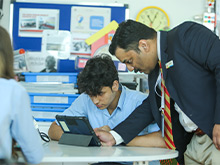Getting a scholarship requires much more diligence than acing the exam. You should try to make every effort to perform well in the scholarship interview. While high scores on your exam are a factor, making the right impression during the interview will improve your chances of securing the scholarship funds. Schools assign equal weightage to both the factors.
Here’s How to Get Ready for a Scholarship Interview
Research about the school
Find out more about the scholarship for school students by checking with the individual schools. What kind of reputation does it have? What is its mission statement? It will tell you what kind of students apply to the school and what their concept of a model student is. You’ll want to factor that into how you’ll present yourself during the interview.
Review your material
Go over your application packet and what you wrote. You’ll want to be on your toes when they ask you about your application. If you’ve already forgotten your answers, then it won’t leave a good impression on your interviewers. Be sure to bring along extra copies of your resume in case you need it.
Practice question and answer sessions
Your comfort level in answering questions will also matter. A little bit of nervousness is all right. Still, if it impedes your ability to express yourself clearly or if it gets in the way of portraying yourself as strong, capable, and the kind of student who will prove to be an exceptional asset to the international school in Pune, then a little bit of practice will help.
Be personal
When you answer the questions, don’t just rattle off a list of accomplishments. Remember, you’re not the only one applying for the scholarship. Most of the applicants will have stellar—some might even have better—academic credentials. Instead, tell them something personal about you. Connect that to an incident that you feel will give them incredible insight into your character and academic potential as a student. It is also one way for you to stand out from the other applicants.
Dress to impress
Show the scholarship committee that you are serious about your application by showing up dressed to impress. You want to let them know in every way possible that you are honoured to be there, talking to the panel, and getting a chance to be considered for the scholarship. Business attire is an excellent choice for this. Slacks and a buttoned-down collared shirt will go well, or a skirt that’s about your knees or a dress. Nothing too short. Also, ditch the sandals and go for closed-toed pumps or black shoes.
Arrive on time
Being late to an interview is one of the worst things you can do as an applicant. Some panels will still give you a chance, but you’re going to have quite a fight on your hands to get them on your side, as being late to your interview doesn’t set a good impression. It creates the impression of not taking the interview seriously, not respecting their time, and not caring if you get the scholarship or not. If you did, then you would have adjusted your schedule for the day to ensure that you got to the venue with plenty of time to spare. Just avoid all the hassles by arriving early at every interview. This way, you can calm down or practice a little more.
Settle down
Before the interview, it might be a good idea just to relax, take deep breaths, and settle down. When you’re calm and steady, you can answer the questions with ease. You won’t have to worry about blanking out at any time during the interview. Regulate your breathing and try to release all the tension and stress that you feel before you sit down for the interview.
Listen to the questions
You want to make an excellent impression and want interviewers to like you. You want them to see all your good qualities. And that sometimes gets people to talk too fast or answer the questions too soon without thinking them through. Don’t do that. Listen actively, so you don’t get the question wrong or don’t have to confirm the question again. Being a good communicator requires having excellent listening skills and not just a knack for talking. Keep that in mind.
Be concise
When you answer the question, avoid going round in circles. Be concise. Offer the information that they need. If you try to incorporate a personal anecdote to create a stronger connection between you and the panel, make sure that you recount that story in the most gripping, entertaining or engaging way possible. It’s one way to shine during the interview.
List down questions
Another way to get ready is to make a list of the possible questions that they will ask you during the interview. Some of these will include:
● Tell us about yourself.
● What is your greatest strength and weakness?
● Do you deserve this scholarship? Why should we award it to you?
● What are your career goals?
● Who has been a role model for you?
● Tell us about a mistake you made and how you handled it.
● Why did you choose this school?
● What activities are you involved in?
● What is a personal achievement that makes you proud?
● Is there anything else that you would like the panel to know?
Be Yourself
Remember, when you apply for a scholarship for school students, you’re going up against a lot of qualified applicants. What’s going to help you stand out from the rest? If you try to be anyone or anything that you’re not, it will backfire on you right away. Be yourself—but be the best version of yourself that you can muster. Be confident. Consider every question with careful consideration, and be respectful. Don’t try to brag about your achievements. Instead, communicate to the panel what your goals are for wanting to win the scholarship.
Show them the big picture. Convince them that you don’t just want it for the monetary reward. How will it make a difference to your studies?? Maybe you have a pet project that you are passionate about, which is connected to a senior thesis that you’ll do at school.
Perhaps you want to start a project that will benefit a lot of people. Let them know who you are, what your vision is of the future, and what you’ll want to do to help make a more significant difference in the world. It will help you stand out and secure the funds you need.
Remember courtesy
It is a given, but when you’re in the moment, or when you’re nervous, you might forget to say please and thank you. These are fundamental ways to show courtesy. You’ll want to make sure you don’t forget them. While it’s not mandatory to thank the panel, taking the time to do so shows them that you are courteous and polite, which goes a long way to making an excellent impression.
The tips mentioned above can help prepare for a scholarship interview in the best way possible. Scholarships for school students are significant credentials that can add a lot of value to their resume. Therefore, devote time and effort to give your best performance in the interview round.



































